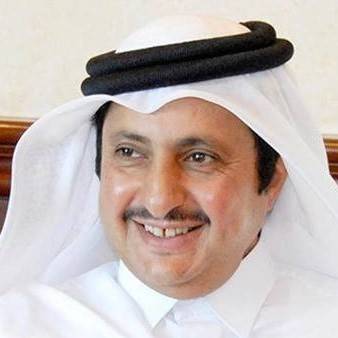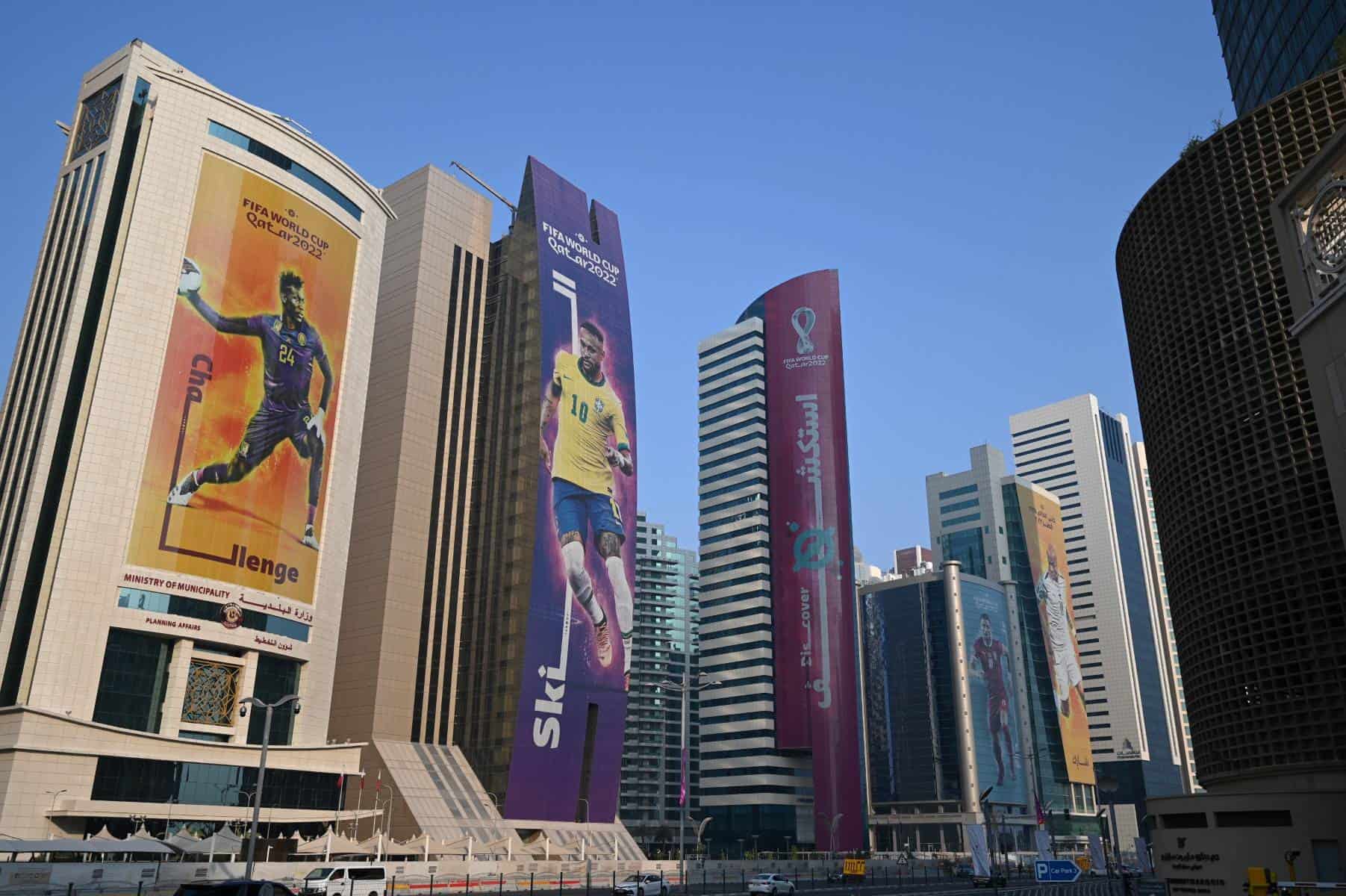The Chairman of Qatar Chamber (QC), Sheikh Khalifa bin Jassim bin Mohammed Al-Thani, has affirmed the pivotal role of the private sector in preparing for the FIFA World Cup Qatar 2022, noting the strong participation of Qatari companies in the World Cup projects, and their supportive services for the tournament in all sectors.
In an interview with a local newspaper, Sheikh Khalifa bin Jassim stressed on the need for concerted efforts by citizens and residents to make this global event a success. He said that the World Cup Qatar 2022 will leave a unique imprint in the history of the FIFA World Cup.
Qatar has become a leading global investment destination, Sheikh Khalifa bin Jassim said, adding the praise of international institutions for the Qatari economy which is expected to grow by 4.9 percent, according to the International Monetary Fund (IMF).
Sheikh Khalifa bin Jassim considered that the promotion of the State of Qatar is one of the most important gains of the World Cup, referring to the positive reflections of the tournament on the development of infrastructure, the boom in tourism and hotel facilities, and transportation and communication services.
The QC chairman said that following the tournament, Qatar’s economy is expected to continue to grow at an accelerating pace, as the country would be the focus of attention of all countries of the world for a long time, and it will benefit from this event and place itself on the map of global investments, adding that this will be in line with the efforts made to achieve the goals of Qatar National Vision 2030.
Strengthening private sector

Regarding Qatar Chamber’s role in supporting the growth of the Qatari economy after the World Cup, Sheikh Khalifa bin Jassim affirmed that the Chamber will continue to play its role in representing and strengthening the role of the private sector in the country’s economic development, and in addressing all challenges and obstacles in order to find appropriate solutions to them, as well as promoting the national economy and strengthening cooperation with all institutions and chambers in all countries of the world. Qatar Chamber will also contribute to participating in the efforts made to achieve Qatar National Vision 2030 by promoting economic diversification and attracting investments to the State.
Sheikh Khalifa bin Jassim explained that QC is keen to enhance communication with all ministries and concerned authorities in the private sector in the country, in order to discuss all the challenges and difficulties it faces in order to fins appropriate solutions to them, provide appropriate recommendations and give an opinion regarding private sector issues.
On the investments of Qatari businesswomen, Sheikh Khalifa bin Jassim said that over the recent years, women’s economic activity was intensified and expanded in many economic sectors, as Qatari women have benefited from the wise leadership’s support and directives and from the government supportive policies, which focus on empowering women and activating their economic participation.
Sheikh Khalifa bin Jassim also underlined that the number of Qatari women who partially or fully own companies registered with the Qatar Chamber is around 7,000, while an additional 4,900 manage the companies along with being authorized signatories, and around 4,700 more women serve as just authorized signatories.
Sheikh Khalifa bin Jassim stressed that the emergence of women in the business sector is due to the Qatari legislations that support and encourage them to establish businesses without discrimination with men, in addition to the facilities provided by the investment environment in the country and the ease of establishing businesses.
With regard to the Reemployment Platform for Employees, Sheikh Khalifa bin Jassim of Qatar Chamber explained that the platform was launched in coordination with the Ministry of Labour, with the aim of streamlining the transfer of employment from some companies that have reduced their businesses or that have redundant workers as a result of the end of some projects to other new companies willing to hire new workers. The platform also aims to help companies recruit qualified and trained workers with experience in the local market instead of entering into the procedures of recruiting new workers from abroad, HE said, noting that this saves time and effort for companies and enhances the progress of projects in the country.
Sheikh Khalifa bin Jassim pointed out that a large number of companies have already benefited from the platform during the last period, and coordination has been made with the Ministry of Labour for the continuity of this platform.
Sheikh Khalifa bin Jassim affirmed the great and continuous support of the wise leadership for the private sector, stressing that the incentives provided by the State to support the private sector are a key driver for its development and for strengthening its role in the development process.
In his interview with Al-Raya newspaper, Sheikh Khalifa bin Jassim said that the private sector enjoys great and continuous support from the wise leadership, out of its belief in the importance of allowing it to be a real partner to the public sector in the renaissance process witnessed by the State, appreciating the State’s support for the private sector. HE also stressed that the private sector is up to the responsibility and capable of playing its hoped-for role in the comprehensive development witnessed by Qatar, especially since this support comes within the framework of economic diversification, which is considered the most important goal of Qatar National Vision 2030.
Sheikh Khalifa bin Jassim noted the State’s allocation of an economic and financial package worth QR 75 billion in order to support the private sector and Small and Medium Enterprises (SMEs) to limit the economic repercussions of the Covid-19 pandemic, in addition to other economic measures, including directing the postponement of loan installments due and the interest or returns on those loans, while providing additional liquidity to banks operating in the country. In addition, Qatar Development Bank (QDB) has been directed to postpone the installments of all borrowers for a period of six months, and government funds were directed to increase investments in the stock market by QR10 billion, HE said.
The Qatar Chamber’s chairman also pointed out that the Qatar Development Bank launched the National Response Guarantees Programat an amount of QR 5 billion to help mitigate Covid-19 impacts with the aim of relieving the most critical short-term payments private sector employers face as it includes Staff payroll-Salaries and Rental fees such as factories, business outlet, warehouse and labor accommodation rent, adding that all these factors contributed to easing the burden on the private sector and helping it recover from the repercussions of the crisis.
Improving labor market
On the reforms approved by the State of Qatar to improve the labor market, Sheikh Khalifa bin Jassim stressed that the State was able during the past few years to carry out a series of reforms, improvements and legislations in the labor market with the aim of providing an appropriate work environment, protecting expatriate workers and providing adequate accommodation for them.
Sheikh Khalifa bin Jassim pointed out that these reforms included setting minimum wages for workers, abolishing the exit permit requirement, allowing migrant workers to change jobs, tightening control over employment, enhancing access to justice and compensation, providing better housing and improving health and safety standards, in addition to cooperating with labor-sending countries in an effort to address the exploitative practices that occur before the worker arrives in the State of Qatar, and to increase the number of labor dispute settlement committees to give workers an easier and faster way to follow up their grievances against their employers.
The Qatar Chamber’s head explained that the State of Qatar has cooperated with international partners to reform the labor market, such as the International Labour Organization (ILO) and many non-governmental organizations, and has worked closely with the business community, which includes Qatari and foreign companies, to ensure their compliance with these standards.
Sheikh Khalifa bin Jassim underlined that Qatar has made remarkable progress in this regard, and that these reforms have achieved the required balance between the rights of workers and the rights of business owners, pointing out that the Chamber is actively seeking to achieve this balance and the importance of preserving the rights of business owners, especially those who are bound by labor laws, and also works to familiarize the business community with the importance of compliance with these reforms and its role in stabilizing the labor market in the country.
He said that there has been a great development achieved by the Qatari industry over the past years, as the number of factories operating in the country has increased. According to data issued Qatar Industrial Portal, the number of industrial establishments registered in the country has increased 835 industrial facilities in 2022, compared to 814 facilities at the beginning of the year, recording a growth in the number of existing factories in the country, with 21 factories entering the wheel of actual production, with investments amounting to QR293 billion, Sheikh Khalifa bin Jassim noted.
The number of projects which started production and were registered in the industrial registry during 2021 amounted to about 60 projects, and the number of industrial projects that are currently being established in the Small and Medium Enterprises (SMEs) Zone reached about 362 projects, he added.
The Qatar Chamber’s chairman said that the total number of industrial lands allocated to the SMEs Zone reached about 826 industrial lands, stressing that the efforts made by the State to develop the business environment and facilitate doing business have created an environment that stimulates business owners and promotes the development of the industrial sector in the country.
Sheikh Khalifa bin Jassim bin Mohammed Al-Thani is the Chairman of Qatar Chamber. Above is the translated and edited version of his interview with Al-Raya newspaper published on Sunday.
The opinions expressed are those of the interviewee and may not reflect the editorial policy or an official position held by TRENDS.







